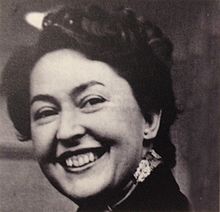Fernando de los Ríos
The paternal side of his family included the moderate politician and government minister Antonio de los Ríos Rosas.[3] Before taking up his chair in Granada, on 19 September 1911 he became a student at the Centro de Estudios Históricos(es) (Center for Historical Studies), a school associated with the ILE.[5] As a liberal intellectual de los Ríos enthusiastically supported the League for Spanish Political Education founded in 1913 by José Ortega y Gasset as a section of the Reform Party.[8] When this failed to make progress in educating the masses he moved towards Socialism in the belief that changes in the structure of power and the economy were needed to raise up the people.[2] De los Rios, who believed in a Fabian-humanist form of socialism, told his hosts in Russia that the PSOE should have the right to pick and choose from the Twenty-one Conditions, and should be completely independent of Moscow.[4] However, the majority of the party led by Besteiro agreed to take advantage of the possibilities offered by the dictatorship, leaving de los Ríos and Indalecio Prieto in a minority.[National Assembly], in which no militant in our ranks will be able to take part, congratulating itself in thus agreeing with the resolution adopted yesterday in the same sense by the Unión General de Trabajadores.[14] De los Ríos announced his resignation from the National Assembly in the plenary session of 29 October 1927, and this was confirmed by royal order of 6 November 1927.[15] De los Ríos, Teodomiro Menéndez, Indalecio Prieto, Gabriel Morón(es), Miguel Mora Requejo and others took the position that the PSOE should work with other republicans in taking action against the dictatorship, although the majority in the party was opposed to such an alliance.[16] In 1928 Fernando de los Ríos joined the student strike caused by recognition of degrees issued by private schools sanctioned by the government, which were mainly run by the Catholic Church."[17] On 14 April he and two other ministers were sent to Barcelona to explain the government position to Francesc Macià, who in the euphoric mood of the time had declared Catalonia an independent state within an Iberian federation.[9] While at the Ministry of Grace and Justice de los Ríos tactfully resolved the conflict caused by the challenge made by Cardinal Segura.[8] Article 26 of the new constitution restricted the power of the religious orders by sharply curtailing their role in education and forcing them to register their income and property.In the heated parliamentary debate over this article in early October 1931 de los Ríos tried to counter the anticlerical tone by pointing out the valuable charitable and medical work of the Church.Manuel Azaña responded by attacking use of these functions as a vehicle for proselytizing, and on 13 October 1931 said "Spain has ceased to be a Catholic country", raising fears that the Republic intended to destroy the Church.[21] He worked with Ramón Pérez de Ayala, Spanish Ambassador in Great Britain, and Abraham Yahuda, professor of Hebrew in Madrid, to persuade Albert Einstein to move to Spain.[6] After the brutal suppression of the Asturian miners' strike of 1934 de los Ríos was part of the investigatory committee which established proof of torture by the army.[2] After the civil war de los Ríos left the Spanish embassy on 31 March 1939 to accept the offer of a professorship from Alvin Saunders Johnson, rector of the New School for Social Research in New York City.[23] When the first Republican government-in-exile was formed in August 1945 its president, José Giral, appointed de los Ríos Minister of State.






Spanish namesurnameMinister of JusticeIndalecio PrietoÁlvaro de AlbornozMinister of Public Education and Fine ArtsMarcelino DomingoFrancisco Barnés SalinasMinister of StateLuis de ZuluetaClaudio Sánchez-AlbornozNew York CityGloria Giner de los Ríos GarcíaSecond Spanish RepublicSpanish Civil WarAntonio de los Ríos RosasCádizFermín SalvocheabaccalaureateCórdobaFrancisco Giner de los RíosInstitución Libre de EnseñanzaMiguel de UnamunoCatholic ChurchCompañía Arrendataria de TabacosSorbonneUniversity of LondonPeter KropotkinUniversity of JenaUniversity of MarburgPablo Iglesias PosseSpanish Socialist Workers' PartyEl SocialistaUniversity of GranadaChurch of San José de MadridMelquíades ÁlvarezFederico García LorcaEpiphanyJosé Ortega y GassetJulián BesteiroLuis AraquistáinFrancisco Largo CaballeroWashington, D.C.International Labour OrganizationAndalusiaUnión General de TrabajadoresAtarfeCommunist InternationalDaniel AnguianoFabianTwenty-one ConditionsBolsheviksRussian Civil WarSpanish Communist Workers PartySpanish Communist PartyCommunist Party of SpainMiguel Primo de RiveraFreemasonsTeodomiro MenéndezCentral University of MadridPact of San SebastiánRepublican uprisingNiceto Alcalá-ZamoraMiguel Mauramunicipal elections of 12 April 1931Francesc MaciàCardinal SeguraManuel AzañaInternational Summer University of SantanderSephardic JewsAlhambra DecreeIsabella I of CastileRamón Pérez de AyalaAbraham YahudaAlbert EinsteinAsturian miners' strike of 1934Luis Jiménez de AsúaAlvin Saunders JohnsonNew School for Social ResearchColumbia UniversityRepublican government-in-exileJosé GiralCementerio de la AlmudenaMarcelino Menéndez y Pelayo